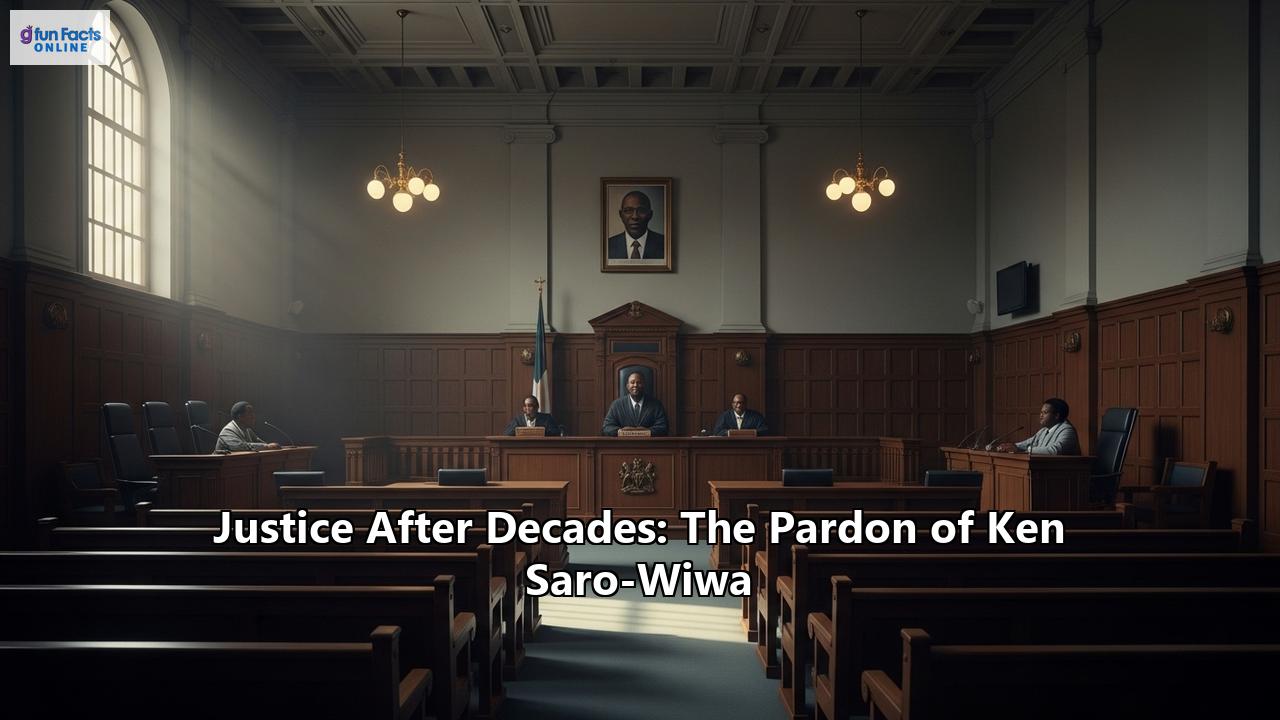Thirty years after their shocking execution ignited global outrage, Nigerian writer and activist Ken Saro-Wiwa and eight of his compatriots, collectively known as the Ogoni Nine, have been granted a posthumous presidential pardon. The announcement, made by Nigerian President Bola Tinubu on June 12, 2025, to commemorate the nation's Democracy Day, marks a pivotal moment in a decades-long struggle for justice that has captivated the world's attention.
In a move steeped in historical significance, President Tinubu also conferred national honors upon the nine men, recognizing them as "heroes" who made "outstanding contributions" to the nation's democracy. Saro-Wiwa was awarded the Commander of the Order of the Niger (CON), while his fellow activists—Saturday Dobee, Nordu Eawo, Daniel Gbooko, Paul Levera, Felix Nuate, Baribor Bera, Barinem Kiobel, and John Kpuine—were each honored as Officers of the Order of the Niger (OON).
"Today, we correct the record and honour their courage in the face of tyranny," President Tinubu declared during a joint session of the National Assembly, exercising his powers under the prerogative of mercy to grant the activists a full pardon. The decision has been met with a complex mix of relief, gratitude, and renewed calls for a more complete form of justice.
A Legacy Forged in Resistance
The story of the Ogoni Nine is inextricably linked to the oil-rich, yet profoundly impoverished, Ogoniland in the Niger Delta. Ken Saro-Wiwa, a celebrated author and intellectual, became the voice for his people, leading the Movement for the Survival of the Ogoni People (MOSOP) in a nonviolent campaign against the devastating environmental degradation caused by decades of oil exploration, primarily by the multinational corporation Shell.
MOSOP accused Shell of polluting the land and water that the Ogoni people depended on for their livelihoods, with little to no economic benefit returning to the community. In 1990, MOSOP drafted the Ogoni Bill of Rights, which outlined their demands for environmental, economic, and political autonomy. Their peaceful protests gained international traction, with a demonstration in January 1993 drawing an estimated 300,000 Ogoni people.
The Nigerian military government at the time, under the rule of General Sani Abacha, responded with a brutal crackdown. The situation escalated tragically when Saro-Wiwa and other MOSOP leaders were arrested and accused of inciting the murder of four Ogoni chiefs who held pro-government views.
A Trial That Shook the World
The trial of the Ogoni Nine by a secret military tribunal was widely condemned by international observers as a sham. Despite pleas for clemency from global leaders and human rights organizations, Ken Saro-Wiwa and his eight colleagues were found guilty and executed by hanging on November 10, 1995.
The executions sent shockwaves across the globe, leading to Nigeria's suspension from the Commonwealth and turning the nation into a pariah state. The deaths of the Ogoni Nine became a powerful symbol of the struggle against environmental injustice, corporate impunity, and authoritarian repression.
The Long Road to Justice: Pardon vs. Exoneration
For nearly three decades, the families of the Ogoni Nine, alongside local and international human rights groups, have tirelessly campaigned for justice. This campaign has consistently centered not just on a pardon, but on a full exoneration, which would formally declare their innocence.
While the presidential pardon is a significant and welcomed gesture, for many, it falls short of this ultimate goal. A pardon, by legal definition, implies forgiveness for a crime committed, which is a premise that supporters of the Ogoni Nine vehemently reject.
The Movement for the Survival of the Ogoni People (MOSOP), the very organization Saro-Wiwa once led, called the pardon a "courageous act" but was quick to point out the distinction. In a statement, MOSOP asserted that a pardon implies wrongdoing, "while in reality no crime ever took place."
This sentiment was echoed by the families of the executed activists. The widow of Barinem Kiobel expressed her gratitude for the national honor but called on the president to "properly declare [her] husband and his compatriots innocent" because a "pardon is not granted to the innocent." This stance is not new; in 2021, the Ken Saro-Wiwa Foundation had rejected a suggestion of a pardon from the previous administration, stating, "Ken Saro-Wiwa and the other eight Ogonis were not criminals. They were innocent activists unjustly murdered for fighting for a just cause."
An Unfinished Chapter
President Tinubu's decision to honor and pardon the Ogoni Nine is a momentous step toward healing a deep national wound. It represents a formal acknowledgment of the grave injustice perpetrated three decades ago and an attempt to posthumously restore the dignity of men who were vilified and executed by the state.
However, the debate it has reignited highlights the enduring complexities of reconciliation. For the Ogoni people and their supporters, the fight continues. The pardon is seen as a crucial chapter in their story, but not the final one. The ultimate goal remains the complete exoneration of the Ogoni Nine, a declaration that would not only clear their names but also fully validate their struggle—a struggle for the right to a clean environment, for corporate accountability, and for the very survival of their people. As the dust settles on this historic announcement, the legacy of Ken Saro-Wiwa and his fellow activists continues to resonate, reminding the world that the quest for true justice is often a marathon, not a sprint.
Reference:
- https://www.bbc.com/news/articles/crmkgn309jdo
- https://www.channelstv.com/2025/06/12/tinubu-grants-presidential-pardon-to-ogoni-nine/
- https://dailypost.ng/2025/06/12/democracy-day-tinubu-grants-full-presidential-pardon-to-ken-saro-wiwa-eight-other-ogoni-activists/
- https://punchng.com/tinubu-grants-posthumous-pardon-to-ken-saro-wiwa-ogoni-nine/
- https://www.thecable.ng/just-in-tinubu-grants-posthumous-pardon-honours-ken-saro-wiwa-eight-ogoni-activists/
- https://sweetcrudereports.com/ogoni-nine-pardon-sparks-reactions-as-mosop-families-demand-exoneration/
- https://www.voanews.com/a/butty-nigeria-saro-wiwa-anniversary-nwinee-11november10-107148463/156807.html
- https://corpaccountabilitylab.org/calblog/2020/11/10/ken-saro-wiwas-legacy-amp-why-his-message-matters-now-more-than-evernbsp
- https://rightlivelihood.org/the-change-makers/find-a-laureate/ken-saro-wiwa-movement-for-the-survival-of-the-ogoni-people/
- https://www.thisdaylive.com/2025/06/12/tinubu-grants-full-pardon-to-ken-saro-wiwa-other-ogoni-9/
- https://www.premiumtimesng.com/news/headlines/800457-tinubu-honours-saro-wiwa-other-ogoni-leaders-executed-by-abacha.html

